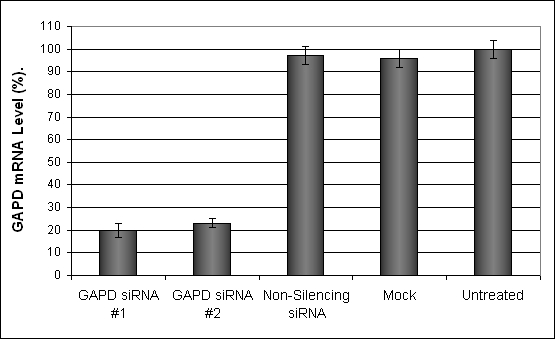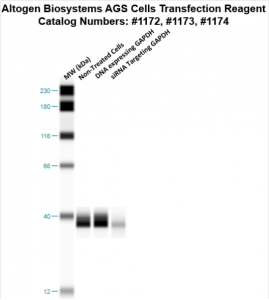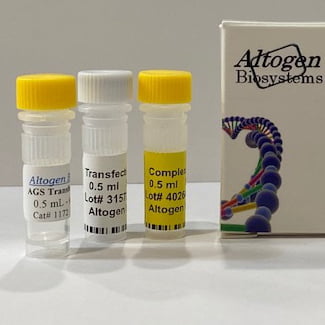Description
Purchase Orders: Click “Add to Cart” button to order, then email PO to orders@altogen.com.
Product Availability: In Stock.
Transfection Reagent for AGS Cells (Gastric Adenocarcinoma, CRL1739)
-
A biodegradable polymer based trasfection agent – once inside the cell, the polymer degrades into smaller less toxic components reducing cell toxicity, facilitating release of the transgene, and improving transfection efficiency
-
Optimized for intracellular delivery of plasmid DNA, siRNA, microRNA, and mRNA
-
High transfection efficiency of both siRNA and plasmid DNA without compromising cell viability
-
Achieve robust siRNA uptake for dependable gene silencing
-
Effective transfection under conditions of up to 40% serum
-
Transfection kit includes Transfection Enhancer reagent
-
Gentle enough to be used for single cell analysis
-
Download in vitro AGS transfection protocol: [PDF]
- Download AGS CRISPR/Cas9 transfection protocol: [PDF]
- Download PowerPoint presentation for AGS cells transfection kit: [PPT]
- UPC/GTIN/EAN: 860002089723
-
Brand: ALTOGEN®, developed and manufactured by Altogen Biosystems
Transfection Efficiency:
Reagent exhibits at least 77% transfection efficiency of siRNA delivery. Transfection efficiency was determined by real-time RT-PCR.
Transfection Protocol and MSDS:
Download Altogen Biosystems AGS Transfection Protocol: [PDF]
Download MSDS: [PDF]
AGS Cell Line:
Gastric cancer remains difficult to cure and is considered the third primary cause of death from cancer worldwide. Because of the lack of early symptoms, it is hard to detect and is often diagnosed at an advanced stage. Inhibition of histone deacetylase (HDAC) was found to suppress the growth of gastric adenocarcinoma cells, as per the 2015 study published in the International Journal of Oncology. siRNA transfection was one of the research methods utilized to explore the progress of HDAC regulation in the cancer cells. The AGS gastric adenocarcinoma cell line is extensively employed in preclinical studies of stomach cancer. The AGS cell line was initially established in 1979 from the stomach tissue of a 54-year-old Caucasian female who suffered from gastric adenocarcinoma (stomach cancer). These cells exhibit epithelial cell morphology and are tumorigenic. The patient received no prior therapy before removal of these cells. AGS cells could be used for research related to different forms of stomach cancer. Altogen Biosystems provides a highly sensitive polymer-based transfection reagent kit for the AGS stomach cancer cell line.
AGS is a human gastric adenocarcinoma cell line that was originally isolated from the stomach tissue of a patient with gastric cancer. This cell line is commonly used as a model system for studying gastric cancer and for evaluating potential therapies. AGS cells are known for their ability to form tumors in vivo when injected into immunodeficient mice, and they are commonly used in preclinical studies to evaluate the efficacy of potential gastric cancer therapies. These cells have also been used to study the molecular mechanisms underlying gastric cancer development and progression. AGS cells are commonly cultured as adherent monolayers and have been shown to express markers of gastric epithelial differentiation, such as mucins and the gastric H,K-ATPase. They are also known to be sensitive to certain chemotherapeutic agents and radiation therapy, which makes them useful for studying drug resistance mechanisms and testing novel therapeutic strategies. In addition to their use as a model system for studying gastric cancer, AGS cells have been used to study a wide range of biological processes, including cell signaling, apoptosis, and autophagy. They have also been used to study the interactions between cancer cells and the immune system and to evaluate potential immunotherapies for gastric cancer. Overall, the AGS cell line is a valuable tool for studying gastric cancer and has contributed significantly to our understanding of the molecular mechanisms underlying this disease.
Mutations:
| KRAS | 3845 | 37 | 12 | 25398284 | 25398284 | Missense_Mutation | SNP | C | T |
| PIK3CA | 5290 | 37 | 3 | 178936092 | 178936092 | Missense_Mutation | SNP | A | C |
| CTNNB1 | 1499 | 37 | 3 | 41266104 | 41266104 | Missense_Mutation | SNP | G | A |
| PIK3CA | 5290 | 37 | 3 | 178928079 | 178928079 | Missense_Mutation | SNP | G | A |
| KCNT2 | 343450 | 37 | 1 | 196250003 | 196250003 | Missense_Mutation | SNP | A | C |
| TOX3 | 27324 | 37 | 16 | 52484429 | 52484429 | Nonsense_Mutation | SNP | G | T |
| ZRANB3 | 84083 | 37 | 2 | 135988495 | 135988495 | Silent | SNP | G | A |
| CEP170 | 9859 | 37 | 1 | 243333048 | 243333048 | Silent | SNP | T | C |
| LRFN5 | 145581 | 37 | 14 | 42356534 | 42356534 | Missense_Mutation | SNP | A | G |
| TPR | 7175 | 37 | 1 | 186302464 | 186302464 | Missense_Mutation | SNP | G | T |
| DCDC1 | 341019 | 37 | 11 | 31312327 | 31312327 | Missense_Mutation | SNP | C | T |
| RAD54L2 | 23132 | 37 | 3 | 51696927 | 51696927 | Missense_Mutation | SNP | G | A |
| OR8K1 | 390157 | 37 | 11 | 56113544 | 56113544 | Silent | SNP | G | A |
| DDX51 | 317781 | 37 | 12 | 132624675 | 132624675 | Silent | SNP | G | A |
Data:

Figure 1. GAPD mRNA levels were quantified using real-time RT-PCR in the AGS cells transfected with siRNAs targeting GAPD or non-silencing siRNA. Forty-eight hours post-transfection, the cells were harvested and analyzed by real-time RT-PCR for GAPD mRNA expression levels. Data were normalized against the 18S rRNA signal. Control samples were either mock-transfected or untreated. Values are normalized to untreated sample. Data are means ± SD (n=5).

Figure 2. Protein expression of GAPDH in AGS cells. DNA plasmid expressing GAPDH or siRNA targeting GAPDH were transfected into AGS cells following Altogen Biosystems transfection protocol. At 72 hours post-transfection the cells were analyzed by Western Blot for protein expression levels (normalized by total protein, 10 µg of total protein loaded per each well). Untreated cells used as a negative control.
Selected in vivo transfection product citations (ALTOGEN® IN VIVO Transfection Kits used in the following publications):
- Hypertension. 2012 59(1):158-66. Role of uncoupled endothelial nitric oxide synthase … Gao et al [PDF]
- Jounal of Biological Chemistry. 2012 287(4):2907. Chaperoning of mutant p53 protein … Gogna et al [PDF]
- PLoS Pathogens. 2012 8(8) Uridine composition of the poly-U/UC tract of HCV RNA … Schnell et al [PDF]
- J Proteome Res. 2012(11) Retinal proteome analysis in a mouse model of oxygen-induced … Kim et al [PDF]
- J Transl Med. 2010 15;8:133. Prevention of hyperglycemia-induced myocardial apoptosis … Zhang et al [PDF]
- Mol Cell Biol. 2013 33(7). SCO2 induces p53-mediated apoptosis by Thr845 phosphorylation … Madan et al [PDF]
- Hypertension. 2015 65(2):430-9. Neurokinin 3 receptor and phosphocholine transferase… Parchim et al [PDF]
- Gastroenterology. 2011 141(2) Differential type I interferon-mediated autophagic trafficking … Desai et al [PDF]
- PLoS Pathog. 2014 10(10) Exosomes from hepatitis C infected patients transmit HCV … Bukong et al [PDF]
Altogen Biosystems:
Altogen Biosystems provides pre-optimized transfection kits and electroporation products for life science research. Transfection products are developed for individual cancer cell line and transfection protocols are optimized to enable high transfection efficiency of biomolecules. Altogen Biosystems developed in vivo delivery products for small animal research, mouse and rat targeted tissue delivery: liver targeted, pancreas targeted, kidney targeted, PEG-Liposome-, Nanoparticle-, Lipid-, and Polymer-based in vivo transfection kits. Advanced formulation of reagents and optimized transfection protocols provide efficient intracellular delivery of biomolecules. Read more about transfection technology at Altogen’s Transfection Resource.
Altogen Labs Research Services:
Altogen Labs provides GLP-compliant contract research studies for pre-clinical research, IND applications, and drug development. Biology CRO services include: Xenograft models (30+), development of stable cell lines, ELISA assay development, cell-based and tissue targeted RNAi studies, safety pharm/tox assays, and other studies (visit AltogenLabs.com).
Volume Options:
- 0.5 ml (Catalog #1172)
- 1.5 ml (Catalog #1173)
- 1.5 ml CRISPR (Catalog #2105)
- 8.0 ml (Catalog #1174)
Purchase Orders: Click “Add to Cart” button to order, then email PO to orders@altogen.com.
Product Availability: In Stock.





